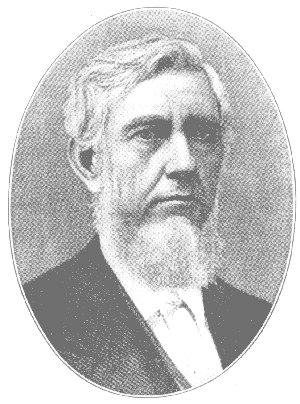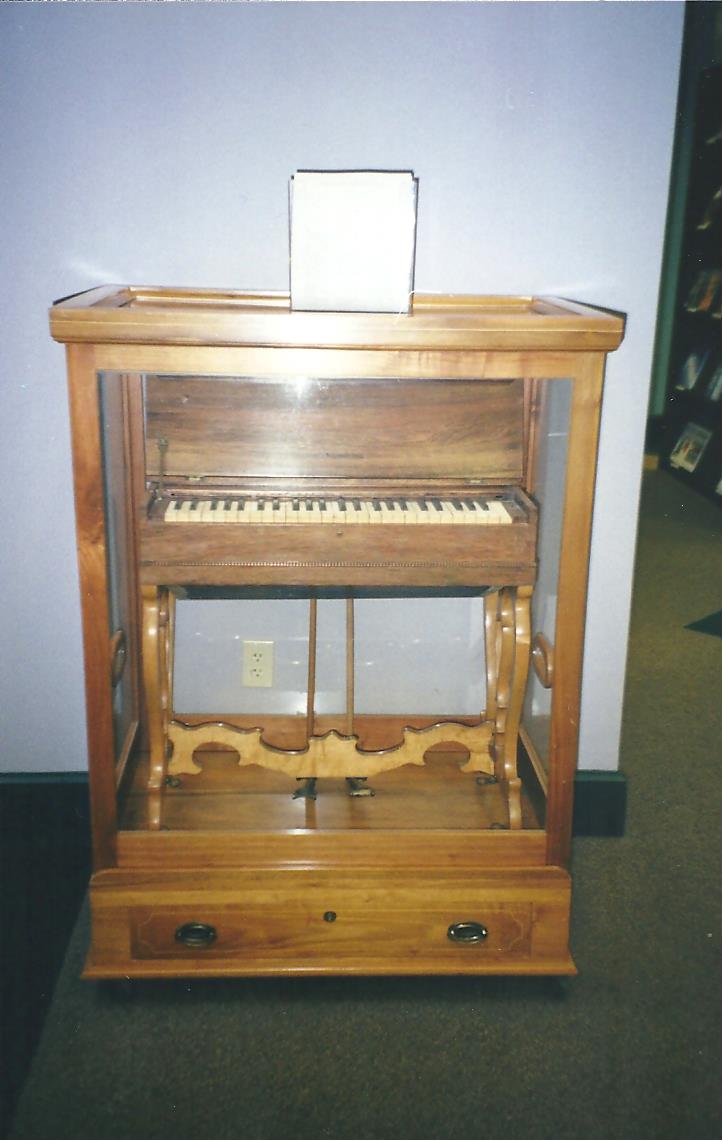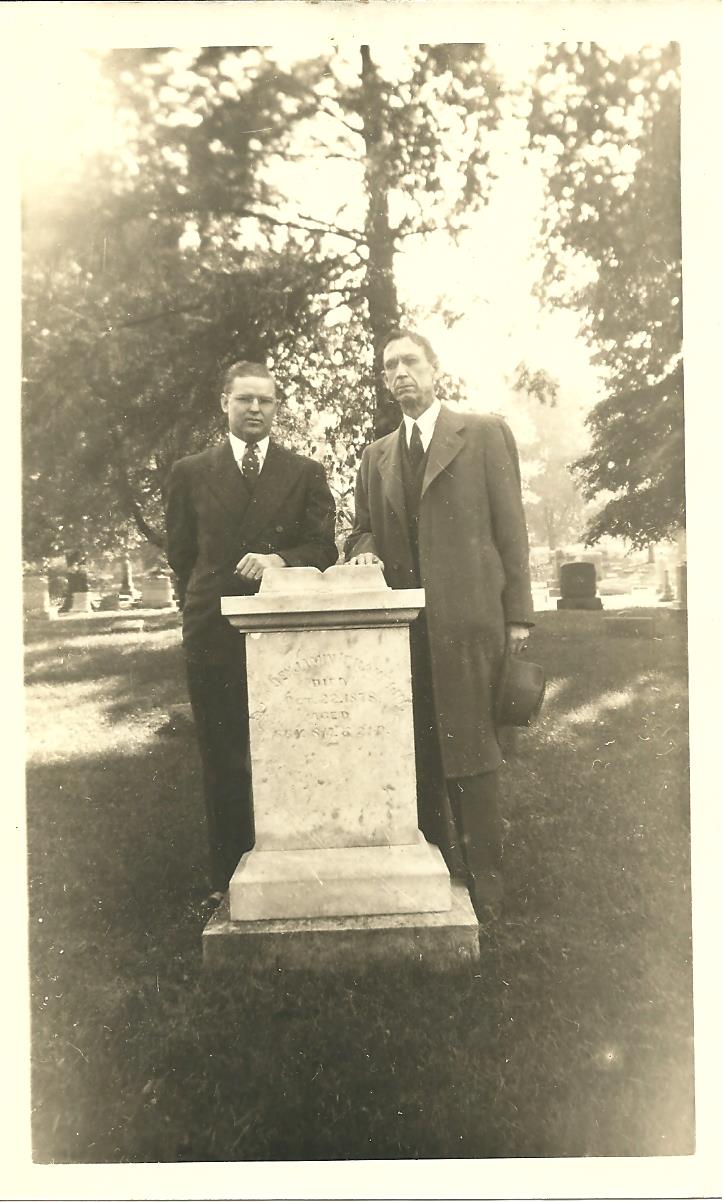Pioneer Preachers - Benjamin Franklin
by Emanuel Daugherty
(material originally presented at Memphis School of Preaching lectures - 1986)
Benjamin Franklin was born in Belmont County, Ohio, on February 1, 1812 and shortly afterward moved to Noble County, Ohio, where he remained until 1833. In May of that year, the Franklins moved to Henry County, Indiana. Also in December that year, Ben married a neighbor girl by the name of Mary Personett. To this marriage were born eleven children. (Rowe & Rice, 14). Benjamin Franklin, gospel preacher, editor, and debater for the Restoration Movement was a great , great nephew of the illustrious patriot and statesman of the colonial era Ben Franklin. (West, Eye, 4).
Franklin's parents had been Methodists but had studied the Scriptures sufficiently to see to it that their baptism was by immersion. Samuel Rogers, a convert of Barton W. Stone, was their closest neighbor and gradually had a great influence on the Franklin family. In February 1836, Ben and his brother Daniel were baptized by Samuel Rogers.(West, Eye, 7-8). Like the Apostle Paul, Ben immediately began to preach. He wanted everyone to hear the gospel story.
In the pulpit, Ben Franklin had few peers. Men like Samuel Rogers, Elijah Martindale, John Longley, and John O'Kane set an example of pulpit excellence before him. He spen hour upon hour memorizing scriptures and devoting himself to prayer. "From his later editorials Franklin was aware that the secret of real pulpit power is the quiet, inner spiritual development of the preacher." (West, Eye, 15). Higher education for Franklin was out of the question, so he read widely from Alexander Campbell, Walter Scott, and Barton W. Stone.(Ibid.). During his lifetime he baptized over 8,000 people. He was tireless in his travels from Canada to the Gulf shore and the Mid-West to the Atlantic. As a gospel preacher he was described thus: "Ben Franklin developed into one of the most powerful proclaimers of the anceint gospel ever known on American soil. While Franklin gained wide fame as an editor and a debater, yet in the pulpit he came as near representing perfection as a gospel preacher that could be found. He quoted scripture voluminously. He did not pretend to be a philosopher, a politician, a teller of stories or anything of the kind. He was a gospel preacher in everything the term implies." (West, Search I, 102-03).

However, it would seem that Franklin's greatest contribution to the church of today is through his writings as editor of the American Christian Review. Earl West has written a book on the life of Benjamin Franklin entitled Eye of the Storm. No more approriate title could have been chosen; Franklin was always at the center of controversy- not by chance or choosing, but because of a love for truth! The voice of the pioneers had been united until about the middle of the 19th century. About that time, the issues of the American Christian Missionary Society and instrumental music in worship came to the fore. It was as an editor then that Franklin constantly found himself in the eye of the storm.
Franklin as an Editor - Dealing with Controversy
W. E. Garrison says of Franklin, "By far the most influential editor, aside from Campbell and Errett, was Benjamin Franklin, a collateral relative of the famous Dr. Benj. Franklin." (Garrison, 113). Garrison continued, "Our Ben Franklin began his long and notable editorial career in 1845 with a paper which, beginning as the Reformer and passing through several changes and mergers, became the American Christian Review. He was a powerful supporter of the missionary society, until after serving as its secretary for a short time, he turned against it and became the most effective opponent of organized work. More important than this was the sledge-hammer evangelism that he carried on incessantly, with the spoken as well as the written word. Completely without formal education, he developed a clear and trenchant style which does not need his biographer's apologies. The favorite theme of his writing, and the sole theme of his preaching, was the "plan of salvation" and the pleas of the Disciples for that simple gospel and the restoration of the church on the apostolic pattern." (Ibid.).
Franklin had begun the American Christian Review in Cincinnati in 1856; his paper was the most influential in the North after the Civil War. "The paper was conservative in its approach to New Testament Christianity. He strongly opposed instrumental music and other innovations." (Phillips, 229). W. T. Moore in his history of the Disciples remarks, "Benjamin Franklin was at that time editor of the American Christian Review, published at Cincinnati. This postion he continued to hold as long as he lived, and his paper became a most influential factor in directing the movement and giving it a certain type which it began to receive soon after the Civil War ended. Many, however, began to feel that the reactionary tendency of Mr. Franklin's paper was not conducive to the best interests of the Disciple movement. In the special type of the movement for which he contenteded he had the support of Mr. Fanning, who was the editor at this time of the Gospel Advocate. While these two men differed with respect to several things, their united influence made the advocacy of their journals a very decided force in the development of what a considerable number of Disciples believed was wholly contrary to the spirit and aim of the Disciple movement, while it was directed by the pioneers. Mr. Franklin was a splendid type of the kind of man adapted to the special work he undertook to do. He spoke in the language of the people. His character was above reproach, and he was indefatigable in his labors and unselfish in his devotion to the cause. For a time he seemed to be in harty sympathy with a forward movement, but it was not long until the influence of his journal was thrown right across the lines of progress, as a great many Disciples understood what progress meant." (Moore, 523).
Along with Franklin, several other editors with their papers were battling the liberal trends. Among these were Moses Lard, Tolbert Fanning, and David Lipscomb; the latter two were the renowned editors of the Gospel Advocate. Much of Franklin's thinking and writing was influenced by the early writings of Alexander Campbell in the Christian Baptist and Fanning in the Advocate.
During the 1850's Franklin tried to avoid the subject of slavery in an effort to keep it from becoming a divisive issue in the church. Franklin was not proslavery nor was he an abolitionist. He felt that this was a political issue best solved by the politicians and the church ought to go about its business of preaching the gospel, converting men to the Lord, and slavery would be obliterated. He viewed the abolitionists as radicals who were turning brethren aside from their mission and sowing seeds of discord. The slavery question when introduced into the pulpit "was converting the pulpit into a political rostrum and the church and ministry into political ministry." Division in the North began with this, "and the Spirit of the Lord departed."(West, Eye, 148).
Also during this period, the question of "Christian Perfectionism" with its mystical subjectivism lending itself to spiritual arrogance became a heated issue. W.S. Russell, I. N. Carmen, T.J. Melish, and George Tait were the principle men connected to this new heresy. "Their sermons amd writings were filled with expression of the 'inner light,' or 'spiritual illumination'." (West, Eye, 162). The biographers of Franklin conclude that it was the teaching of Professor Robert Richardson and his views of the indwelling of the Holy Spirit that started these men toward apostasy. Richardson believed that Campbell and others had dwelt long enough on "first principles but it was now time to go on to perfection." Richardson stated that there was a "higher law" of human nature, a spiritual perception which is to be quickened by the Holy Spirit, and without which quickening none can be spiritually minded or enjoy the things of the Spirit. (Franklin & Headington, 354-56). (This entire chapter in Franklin & Headington's biography ought to be read and studied extensively in the face of present efforts to compromise truth in regard to the leading of the Spirit - EBD). Franlkin gives some of his reasons for his vigorous opposition to this error in the Review as quoted by West: "We do not dislike this new phrase that has appeared among us because it aims at a deeper piety in our devotion or a greater spirituality, for we do not believe there is anything of this sort in it; but we dislike it because it turns men's attention away from the Bible and from the obedience which the Lord requires. In the place of turning the attention of man to the teachings of the Holy Spirit in the Bible, it turns his attention to the so-called 'divinity within' the 'voice of conscience' or the 'inner light' for divine instruction or divine direction. In the place of directing men's attention to what God requires him to do, it leads him to theorize on the work of the Spirit. These theorizers appear not to perceive that the Spirit is not induced to act upon man by theorizing about his work, or the manner of it."(West, Eye, 164).
During the Civil War, the question of whether Christians should go to war was the topic of concern. Ben Franklin's stand was for peace and urged brethren not to enter the fighting on either side, but to continue preaching and saving men from sin. "We cannot always tell what we will or will not do, but we can sometimes tell what we will not do. There is one thing, however things may turn or whatever may come, that we will not do and that is, we will not take up arms against, fight and kill the brethren we have labored 25 years to bring into the kingdom of God. Property may be destroyed, and safety may be endangered, or life lost, but we are under Christ and we will not kill or encourage anybody else to kill or fight the brethren." (West, Eye, 170). Franklin's pacifist pleadings were in vain, however, and many Christian men on the North and South died on far flung battlefields.
Garrison lists these as the primary issues facing the Restoration in the period from 1866-75: "open or close communion; use of the title 'Reverend'; the 'one man system' of the pastorate; the alleged introduction of a creed; the use of the organ; and the missionary societies." (Garrison, 119). While all these subjects were worthy of debate, only the latter two proved to be divisive.
At first Franklin endorsed the Societies, but as time went by, he saw problems developing and then became one of the chief spokesmen against them. F. M. Green, historian of missions among the Disciples, gives credit to D. S. Burnett for organizing the first missionary society among them. D. S. Burnett wrote, "I consider the inauguration of our society system which I voed to urge upon brethren, if God raised me from my protracted illness of 1845, as one of the most important acts of my career." (as cited in Hailey, 151). Commenting on the statement of Burnett that the idea for the society had originated in a sickroom, John T. Lewis said, "You know sprinkling for baptism also came from a sickroom." (Lewis, 50). One of Fraknlin's early editorials displayed the route he would later follow. "We are pefectly aware that if we wish to put the Christian communities into the power of men, to control them, wield them, and make them engines to honor man, we need some kind of an organization, beyond the simple organization of the New Testament; but the simple, independent church, for keeping the ordinances, religious instruction, and saving the world, is all sufficient for the good of the saints and the glory of God. Indeed, one of the principal reasons why this question of organization has perplexed the minds of so many is, that they are looking for, and trying to make out of something unknown to the whole New Testament. They overlook the simple, easy, and common-sense arrangement of the New Testament, and complain that we have no arrangement." (West, Search I, 197). Completing his departure from the Missionary Society, Franklin summarized: 1) In the time of the apostles there were no such plans. "God gave no plans of the sort of which we are speaking." 2) Without any such schemes in the first century the gospel was preached so there were six million Christians in the empire at the end of the first century. 3) We spread the gospel more rapidly before we had these schemes. 4) Most of what is presently being done is without them. (West, Eye, 233).
His opposition to the Society, however, caused the rift that had developed between the liberal and conservative segments of the church to widen even further. Franklin was held up to great ridicule for his opposition to the digression taking place. He was charged with being a "millstone about the neck of the reformation," an "old fogey," and an "alarmist." To such he replied, "Who are they that are against us? They are the men who think that much of the work by A. Campbell will have to be undone; the friends of the organ in worship; of extravagant, fine, houses of worship; festivals, fairs, organ concerts in churches, etc." (West, Search II, 134).
Instrumental music in worship was intolerable to Ben Franklin. His attitude toward the instrument can be seen in the following: "We have no prejudice against an organ, melodeon, piano, violin, or Jews' harp, but we do not intend to worship with any of these, or even tacitly to endorse the use of them, or any one of them in worship . . . We intend that no man shall quote us, while we are living or when we are gone, as endorsing or in any way giving countenance to the evil complained of. If brethren will introduce the instrument into worship, they shall themselves be held responsible. We shall not be. We therefore desire brethren not to invite us to hold a meeting for them, if they intend to play on an instrument in their worship. We know positively that it is safe to keep it out." (West, Search II, 82).

Melodeon at Midway, Kentucky
Franklin maintained that, "The worship in all its parts - all its elements - is a matter of revelation - divinely prescribed." In reply to an article by Isaac Errett, Franklin said, "We put it on no ground of opinion." (West, Search II, 88-89). Earl West's summary on the subject is most appropriate. "Clearly, then, to Franklin instrumental music was no matter of opinion. Man had no right to add an element of human origin to the divine worship, for such inescapably had to be an innovation. The two views, championed by Errett on one side and Franklin on the other, were poles apart. Down to the present day they had been the fundamental reason why fellowship between the churches of Christ, on one side, and the Disciples of Christ denomination, on the other, is inconceivable. If the use of the instrument is purely a matter of opinion, then, admittedly, any dispute about it borders on the ridiculous. If, however, the instrument is a human innovation, an addition to the divine worship, then it is sinful to use it. This latter view being accepted, there is no possible, consistent ground for compromise with the former." (West, Search II, 89).
Ben Franklin departed to be with the Lord on October 22, 1878. With tongue and pen, he had fought the good fight. David Lipscomb wrote, "The cause loses its most able and indefatigable defender since the days of Alexander Campbell, and his loss is simply irreparable." Jacob Creath lamented, "If our own brethren believed in canonization among our great men, and if their mantles ever fell upon any man, that man was Benjamin Franklin. His death is universally regarded by the readers of the Review as a great loss to our restoration. He has left no one who can fill his place, and we should not see his like soon again." (West, Eye, 336).

Franlkin's Tombstone in Anderson, Indiana
Works Cited
Franklin, Joseph and J.A. Headington. The Life and Times of Benjamin Franklin. Rosemead, CA: Old Paths Book Club, 1956 reprint of 1879 original.
Garrison, W. E. An American Religious Movement. St. Louis: The Bethany Press, 1945.
Lewis, John T. The Voice of the Pioneers on Instrumental Music and Societies. Nashville: Gospel Advocate, 1932.
Moore, W. T. A Comprehensive History of the Disciples of Christ. New York: Fleming H. Revell, 1909.
Phllips, Dabney. Restoration Principles and Personalities. University, AL: Youth in Action, 1975.
Rowe, John F. and G. W. Rice. Biographical Sketch and Writings of Elder Benjamin Franklin. Shreveport, LA: Lambert Book House, reprint of 1880 edition.
West, Earl I. The Search for the Ancient Order, vol. I. Nashville: Gospel Advocate Company, 1949.
__________. The Search for the Ancient Order, vol. II. Nashville: Gospel Advocate Company, 1950.
__________. Elder Benjamin Franklin: Eye of the Storm. Germantown, TN: Religious Book Service, 1984.
